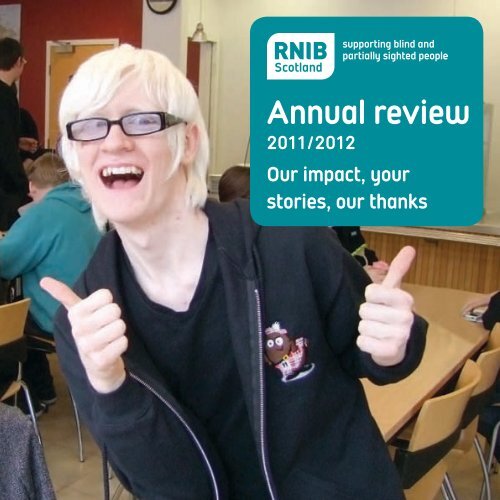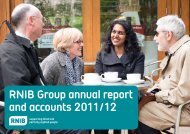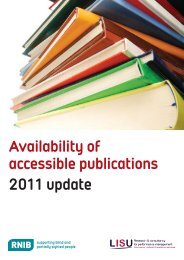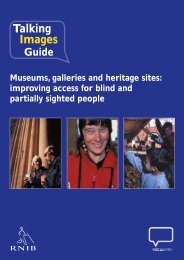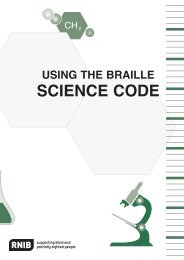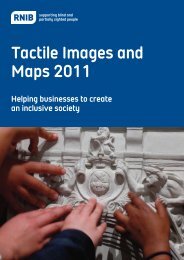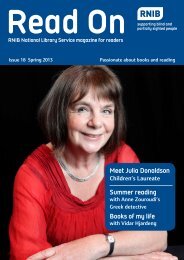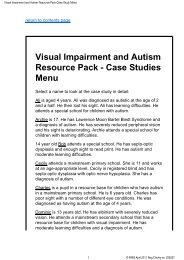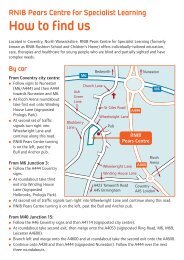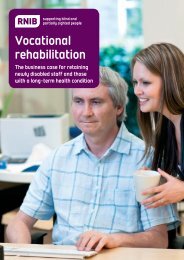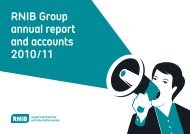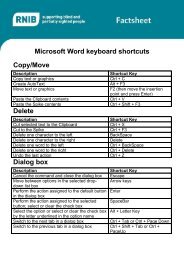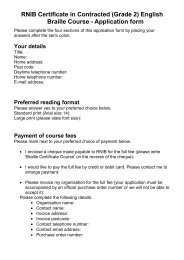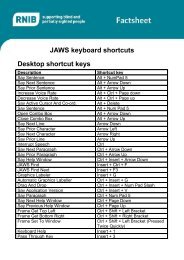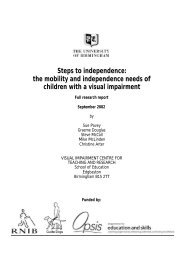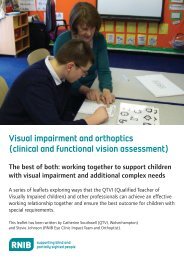RNIB Scotland Annual Review 2011-12 (PDF 1.49 MB)
RNIB Scotland Annual Review 2011-12 (PDF 1.49 MB)
RNIB Scotland Annual Review 2011-12 (PDF 1.49 MB)
Create successful ePaper yourself
Turn your PDF publications into a flip-book with our unique Google optimized e-Paper software.
<strong>Annual</strong> review<br />
<strong>2011</strong>/20<strong>12</strong><br />
Our impact, your<br />
stories, our thanks
Full sight<br />
Cataract<br />
Macular degeneration<br />
Glaucoma<br />
Myopia<br />
Diabetic retinopathy<br />
2<br />
These images are of the Scottish Parliament building seen through different<br />
sight loss conditions. They were used on the cover of our manifesto for the<br />
<strong>2011</strong> Scottish Parliament elections.
Contents<br />
Introduction 5<br />
Stopping people losing their sight unnecessarily 10<br />
Supporting independent living 16<br />
Creating an inclusive society 24<br />
Thank you 30<br />
A brief look at our finances 38<br />
How you can help 41<br />
Your audio CD 43<br />
The photograph on the cover was taken at our<br />
Haggeye youth forum’s summit in Edinburgh, which<br />
brought together young people with sight loss from<br />
across the UK.<br />
3
43 per cent of<br />
blind and partially<br />
sighted people<br />
would like to<br />
leave the house<br />
more often.<br />
4
Introduction<br />
This has been an incredibly challenging year for us as a charity and more<br />
importantly for blind and partially sighted people across <strong>Scotland</strong> and the UK. But<br />
despite the real problems that cuts to income and services are causing, we are still<br />
very proud of the impact that our staff and supporters have achieved this year for<br />
people with and at risk of sight loss.<br />
We began the year by empowering blind and partially sighted people to voice their<br />
fears as part of the Hardest Hit campaign to tackle the potential impact of the<br />
Welfare Reform Bill on their lives. In October we organised the biggest ever rally<br />
of disabled people in <strong>Scotland</strong>. This campaign contributed to a notable success in<br />
the reversal of the Government’s proposed changes to Disability Living Allowance<br />
(DLA), which would have had a devastating impact on blind and partially sighted<br />
people in residential care. However, as the year draws to a close our attention is<br />
focused on the proposed change from DLA to Personal Independence Payment<br />
(PIP) in 2013. According to the Government’s own figures, about half a million<br />
people would lose their entitlement altogether as DLA is replaced by PIP. Others<br />
will qualify for a lower rate than they currently receive.<br />
The criteria for the new benefit fail to recognise that sight loss is a serious<br />
disability and that you face extensive extra costs if you can’t see, and that these<br />
are ongoing. This will hit blind and partially sighted people particularly hard and<br />
we will campaign tirelessly to ensure that their quality of life is not reduced by<br />
proposed welfare changes that are unfair.<br />
Introduction<br />
5
The efforts to reduce public spending has also led to wide-ranging reviews of<br />
what services might be reduced or even scrapped. We were concerned that the<br />
Independent Budget <strong>Review</strong> Panel, commissioned by the Scottish Government to<br />
identify potential public spending savings, mentioned free eye examinations, first<br />
introduced in <strong>Scotland</strong> in 2006. We thought this would be a seriously retrograde<br />
step. Eye examinations play a key role in tackling avoidable sight loss, detecting<br />
sight-threatening conditions early on when they can be arrested or even reversed.<br />
They can also detect the signs of other major conditions such as stroke and<br />
diabetes. As it happened, just a few months later a<br />
study by Aberdeen University concluded that free<br />
eye examinations have been successful in prompting<br />
more Scots to get their eyes tested, although it also<br />
stressed that more must be done to get the eyehealth<br />
message out to hard-to-reach groups.<br />
This was a message we strongly reinforced at a<br />
meeting in March of the various stakeholders in the<br />
Scottish Vision Strategy. This strategy is a landmark<br />
attempt to improve eye health and eradicate<br />
avoidable sight loss. An interim review, prepared by<br />
Aberdeen University<br />
concluded that free<br />
eye examinations<br />
have been successful<br />
in prompting more<br />
Scots to get their<br />
eyes tested<br />
<strong>RNIB</strong> <strong>Scotland</strong>, suggests we have made some encouraging advances along this<br />
path. One example is the new Electronic Digital Referral System being pioneered<br />
by NHS Fife which instantly sends images of eye scans from ophthalmologists to<br />
eye clinics, significantly reducing referral times. This has already saved the sight of<br />
some patients.<br />
6<br />
Introduction
<strong>2011</strong>/<strong>12</strong> was a key year for<br />
Scottish democracy with<br />
political parties contesting<br />
elections for both the<br />
Scottish Parliament in <strong>2011</strong><br />
and for the country’s 32<br />
local authorities in 20<strong>12</strong>.<br />
With key areas, such as<br />
health and social care,<br />
devolved to Holyrood and<br />
local authorities still a vital<br />
source of support for many<br />
people with sight loss, it was<br />
important that candidates<br />
and their parties were<br />
fully aware of the issues.<br />
We published manifestos<br />
for both elections, outlining what actions could most cost-effectively make a<br />
difference to the lives of blind and partially sighted constituents.<br />
The impact of the services <strong>RNIB</strong> provides across the UK was also something for us<br />
to be proud of. Not least the fact that our National Library Service sent out over<br />
one and a half million books in braille, audio and giant print – including books<br />
by Scottish authors or with Scottish themes transcribed by our centre in Partick –<br />
enabling 46,000 blind and partially sighted people to enjoy reading. At our annual<br />
event at the Edinburgh International Book Festival, we were enormously lucky to<br />
have author Julia Donaldson lend her support to our drive to have more books<br />
available in accessible formats.<br />
Introduction<br />
7
Meanwhile, our Helpline and information services dealt with over 450,000<br />
enquiries, providing people with reassurance and increased self confidence. Many<br />
of these enquiries were focused on the pressures people were facing due to the<br />
economic climate.<br />
Our campaigning for financial independence for those with sight loss has been<br />
tremendously successful this year. Our work to persuade banks to provide talking<br />
cash machines has resulted in Barclays committing to rolling them out in the next<br />
year, and Lloyds Banking Group have committed to make their ATMs talk and will<br />
be targeting 1,500 machines in 2013. This commitment<br />
will work across all their brands which include Halifax,<br />
Bank of <strong>Scotland</strong> and Lloyds TSB. These changes will<br />
enable more blind and partially sighted people to<br />
access and manage their own money independently.<br />
We gave over<br />
1,000 blind and<br />
partially sighted<br />
people support to<br />
claim the benefits<br />
they are entitled to.<br />
All of this fantastic impact, some of which you can<br />
find out more about in this report, would not have<br />
been possible without the fantastic generosity of<br />
our supporters. To name but a few, thank you to our<br />
network of volunteers who make up our technology support squad providing<br />
practical support in people’s homes, and to our campaign supporters all over<br />
<strong>Scotland</strong> who have continued to challenge service delivery that is inaccessible to<br />
blind and partially sighted people, to make society more inclusive.<br />
And thank you to everyone who has supported us with a generous gift, including<br />
those who took part in our new annual fund-raising event – Read for <strong>RNIB</strong> Day –<br />
which was launched in October.<br />
8<br />
Introduction
However we must continue to focus on the very real threats that exist to the lives<br />
of blind and partially sighted people and those at risk of sight loss in <strong>Scotland</strong>.<br />
This year we will continue to do all we can in these very difficult times to improve<br />
the quality of life and independence of people with sight problems.<br />
Ken Reid<br />
Chair, <strong>RNIB</strong> <strong>Scotland</strong><br />
John Legg<br />
Director, <strong>RNIB</strong> <strong>Scotland</strong><br />
Introduction<br />
9
There are around<br />
188,000 people living<br />
in <strong>Scotland</strong> with a<br />
significant degree of<br />
sight loss.<br />
10 10<br />
The total annual<br />
cost of sight loss in<br />
<strong>Scotland</strong> is close to<br />
£500million.
Stopping people<br />
losing their sight<br />
unnecessarily<br />
Over 50 per cent of sight loss in<br />
<strong>Scotland</strong> can be avoided. We do all we<br />
can to reach the people most at risk<br />
of losing their sight with crucial eye<br />
health messages and to ensure that<br />
potentially sight-saving treatments<br />
are available to all.<br />
11 11
Working to eliminate the huge proportion of sight loss<br />
that is avoidable<br />
Although the devastating experience of losing your sight can happen to anyone<br />
we are particularly targeting the most at risk groups. “Don’t get left in the dark”<br />
was the message we promoted to the Diwali festival of lights in Glasgow in<br />
November and invited revellers to try a basic visual acuity test. The city’s ethnic<br />
minority population is almost three times the Scottish average. In March, Scottish<br />
Health Secretary Nicola Sturgeon visited our pioneering project in South Glasgow<br />
that is working to highlight the vital importance of eye examinations to Glasgow’s<br />
Pakistani community.<br />
Working to ensure policy and decision-makers<br />
understand the importance of potentially sight-saving<br />
eye examinations<br />
With the number of Scots affected by sight loss projected to double, we launched<br />
our manifesto for the Scottish Parliament elections in May. Our proposals could<br />
help contain this explosive increase while transforming the lives of people who are<br />
already blind and partially sighted. <strong>RNIB</strong> <strong>Scotland</strong> pressed all political parties to<br />
preserve free eye-examinations as a vital step in diagnosing preventable sight loss<br />
early on. For those conditions that can’t be treated, our manifesto called for better<br />
emotional support. Too often, people get no help in coming to terms with the<br />
prospect of losing their vision.<br />
<strong>12</strong><br />
Stopping people losing their sight unnecessarily
The number of people with sight<br />
loss in <strong>Scotland</strong> is projected to<br />
double by 2031.<br />
Last year, 1.8 million people had<br />
free eye examinations, and<br />
80,000 were referred on for<br />
further potentially sight-saving<br />
treatment.<br />
Speaking up for the needs of people with sight loss to<br />
those planning vital services<br />
A high-profile conference met in March to gauge the progress of the Scottish<br />
Vision Strategy, launched as part of a global drive to push through ambitious<br />
eye health targets. Although <strong>Scotland</strong> remains a world leader in some aspects of<br />
eyecare, the number of blind or partially sighted Scots is projected to double by<br />
2031. Already one in six appointments in some hospitals are for eye problems.<br />
We have made tangible advances, and in some cases big steps forward. In other<br />
areas, we still have work to do. But, overall, this conference marked a very<br />
encouraging assessment of how far we have come.<br />
Stopping people losing their sight unnecessarily<br />
13
Challenging health service providers not to cut<br />
potentially sight-saving treatments<br />
New research by Aberdeen University in March confirmed that the Scottish<br />
Government’s policy of free eye tests, introduced in 2006, has succeeded. Last<br />
year, 1.8 million people had free eye examinations, and 80,000 were referred on<br />
for further potentially sight-saving treatment. But the findings also reveal that the<br />
impact has been unevenly spread and more must be done to encourage the least<br />
well off to have their eyes tested, including the marginalised and isolated elderly.<br />
Eye tests can play a crucial role in identifying sight loss conditions early on when<br />
they can be arrested or reversed, as well as other health problems such as brain<br />
tumours.<br />
This research proves that the policy has led to more Scots, overall, having their<br />
eyes examined. We know that this has led to more people’s sight and other<br />
conditions being diagnosed in time to treat them. This is hugely more costeffective<br />
than meeting the health and social costs of people who might otherwise<br />
go on to lose vision or suffer ill-health unnecessarily. But it also reveals that we<br />
still have a job to do to get this important message across to the least advantaged<br />
members of society.<br />
Before free eye health checks were introduced, fewer Scots had their eyes<br />
tested than people in other parts of the UK. However just two years later, the<br />
relative difference had reduced, the research notes. Free eye health checks have<br />
unquestionably improved the health of <strong>Scotland</strong>. We now need to ensure everyone<br />
understands just how important getting your eyes tested regularly really is.<br />
14<br />
Stopping people losing their sight unnecessarily
Paul’s story<br />
Paul is 50 and has Down’s Syndrome.<br />
His carers noticed he was increasingly<br />
reluctant to leave his flat and no longer<br />
seemed to recognise them. One of Pauls’<br />
review team had been on <strong>RNIB</strong>’s Vision<br />
Champion training and suspected the<br />
problem could be sight loss. Paul was<br />
supported to see an optometrist and was<br />
diagnosed with dense cataracts in both<br />
eyes. This made watching television,<br />
recognising faces and looking at pictures<br />
very difficult. Because the Vision<br />
Champion could demonstrate that Paul’s<br />
visual needs were understood and that<br />
his carers could provide support and care,<br />
treatment went ahead and was successful.<br />
Paul’s carers say the difference is amazing.<br />
One in six hospital<br />
appointments are for<br />
eye problems.<br />
“ We were watching an able man lose the things he enjoyed<br />
in life and we can’t believe the difference his operation<br />
has made. The old Paul is back smiling and enjoying life.”<br />
(Based on a case study from the Realise Project in West Dumbarton<br />
– photograph is of a model).<br />
Stopping people losing their Stopping sight unnecessarily people losing their sight unnecessarily 15
66 per cent of blind and<br />
partially sighted people of<br />
working age are unemployed.<br />
16 16<br />
There are around 2,135 children<br />
and young people living with<br />
sight loss in <strong>Scotland</strong>.
Supporting<br />
independent living<br />
We want blind and partially sighted<br />
people to have the opportunity to<br />
remain as independent as possible and<br />
we provide the services, support and<br />
solutions to enable this.<br />
17 17
Supporting people when they are diagnosed with<br />
a sight threatening condition<br />
Our Vision Support Service is often the first support people will receive to help<br />
them to come to terms with sight loss. The service has given support to over<br />
1,160 people when they were first told they are losing their sight. During the year,<br />
we have increased the number of eye clinics where this vital support is available<br />
to five, as well as further developing the expert nature of the support through<br />
training and development opportunities for our vision support workers.<br />
Emphasising how local authorities can make a<br />
difference to the lives of people with sight loss<br />
Local authorities are the most important day-to-day agent in the lives of many<br />
blind and partially sighted people. But public spending cuts could push this group<br />
back to the margins of society. In our manifesto for the Scottish local authority<br />
elections, we urged councils to safeguard the right of those with sight loss to lead<br />
independent lives with dignity. If services are cut – at the same time as welfare<br />
benefits are tightened nationally – it would mean a grim future for some of the<br />
most vulnerable people in society.<br />
18<br />
Supporting independent living
Over 1,160 people were given<br />
support and advice when they<br />
were diagnosed with sight loss.<br />
Over 1.6 million talking books<br />
were sent to blind and partially<br />
sighted people across <strong>Scotland</strong><br />
and the rest of the UK.<br />
Improving the quality of life through our new Learning<br />
and Development Centre<br />
Her Royal Highness Princess Anne officially opened a new facility in Glasgow in April<br />
that will help people with sight and hearing loss move into employment. The Learning<br />
and Development Centre, managed by <strong>RNIB</strong> <strong>Scotland</strong>, is based within the City of<br />
Glasgow Council’s Centre for Sensory Impaired People. The centre includes a work club,<br />
where participants can develop job-search and interview skills and support each other,<br />
and a social enterprise café.<br />
Supporting independent living<br />
19
Enabling people to retain work when losing their sight,<br />
or to find new employment<br />
Losing your sight should not mean losing your job. Working and earning your<br />
living can be vital to self confidence and independence. We are determined to help<br />
people keep their job when they are losing their sight, and find new work if they<br />
need to. But the shocking fact is that only 33 per cent of blind and partially<br />
sighted people of working age are in employment. This year, through working with<br />
employers and training and supporting blind and partially sighted people, we have<br />
helped 75 people retain their job and 59 find new employment, and thereby to<br />
build and maintain their confidence.<br />
Mohammed Binyameen, 24, from Glasgow is partially sighted and used our<br />
Learning and Development Centre regularly to carry out job searches and to apply<br />
for jobs. He also took part in a call-handling training pilot in the centre and<br />
offered valuable feedback as he had previously worked himself in call centres.<br />
Mohammed took part in the pilot of Launch Pad, our employability course, and<br />
supported other participants with IT difficulties. He moved into permanent work<br />
with Teleperformance and speaks highly of the support he had from <strong>RNIB</strong><br />
<strong>Scotland</strong>.<br />
“ I found the Learning and Development Centre a really great help.<br />
What I particularly liked was you were free to pop in whenever<br />
you wanted to use the facilities. There were easily accessible<br />
computers available and always a member of staff there to help<br />
and support you.”<br />
20<br />
Supporting independent living
Our Helpline dealt with 450,000<br />
enquiries from <strong>Scotland</strong> and<br />
across the UK.<br />
We identified over £3.5million<br />
in unclaimed benefits and other<br />
entitlements for blind and<br />
partially sighted people.<br />
Helping people to manage the potential impact on<br />
their lives of cuts to services and benefits<br />
Over £3.5million in extra income was won for over 1,000 blind or partially<br />
sighted people in <strong>Scotland</strong> thanks to our free Benefits Helpline, run with<br />
funding from Standard Life plc. The welfare system can be very bureaucratic for<br />
anyone to get their head round, especially if you have difficulty seeing. Some<br />
people just give up. But this means they can be left unable to afford basic<br />
things like heating their home or using public transport. With public spending<br />
cuts set to start biting, benefits could become even harder to access. One client<br />
initially refused Disability Living Allowance had his claim immediately reinstated<br />
at a tribunal appeal. We represented him at because it was so obvious the tests<br />
were inadequate.<br />
Supporting independent living 21
Fighting to ensure blind and partially sighted people receive<br />
the services and support to which they are entitled<br />
Hundreds of people assembled in Edinburgh on October 22 to take part in <strong>Scotland</strong>’s biggest<br />
ever protest against plans to reform disability benefits. The ‘Hardest Hit’ rally in the capital’s<br />
Princes Street Gardens condemned proposals that could slash up to £1billion from the income<br />
and services of people with disabilities over the next four years.<br />
The rally was organised by a coalition of leading Scottish charities, led by <strong>RNIB</strong> <strong>Scotland</strong>, who<br />
warned that people with disabilities or long-term conditions will be hit hardest by cuts to the<br />
support they need to live their lives with dignity.<br />
Many protesters fear changes to benefits such as Disability Living Allowance and Employment<br />
and Support Allowance will significantly reduce their weekly incomes and force others to<br />
undertake fit-for-work tests that have been widely criticised as flawed.<br />
Disabled activist Pam Duncan said: “Over 47 per cent of disabled people live in poverty<br />
already, yet we face not only benefit cuts but a double whammy of cuts to our services too.<br />
Of course we need to get to grips with public debt. But disabled people shouldn’t have to<br />
bear the brunt of this. We don’t have the broadest shoulders.”<br />
Other speakers included Lord Colin Low, president of the European Blind Union and a former<br />
chair of <strong>RNIB</strong>. They called on the Government to ensure that changes to benefits do not make<br />
disabled people worse off, that the welfare system helps people to meet the additional costs<br />
of living with a disability, and that assessments that test people’s ability to work are improved.<br />
Campaigners say that disabled people, those with long-term health conditions and their<br />
families are already twice as likely to live in poverty, with nearly half having no savings at all<br />
(compared to just <strong>12</strong> per cent of the general population). Cuts to the support they depend on<br />
could push many into poverty, debt and isolation.<br />
22<br />
Supporting independent living
Why our chair Ken Reid<br />
supported the Hardest Hit<br />
Ken Reid, who became chair of <strong>RNIB</strong><br />
<strong>Scotland</strong> in January, is registered blind and<br />
currently receives<br />
the lower-level<br />
mobility<br />
component of<br />
Disability Living<br />
Allowance. His only<br />
other income is a<br />
pension from his<br />
former employer.<br />
“ DLA helps cover the cost of computer software which enables me to handle<br />
my own correspondence independently. Without it, I would have no privacy.<br />
DLA also pays for things like talking kitchen-scales which cost about four<br />
times what ordinary ones do.<br />
I had been hoping to get the higher-rate mobility component of DLA.<br />
Then I could actually contemplate taking taxis too. At the moment I have to<br />
use train and bus and often rely on assistance from strangers to help me<br />
complete my journey.”<br />
Supporting independent living<br />
23
60 per cent of blind and<br />
partially sighted people need<br />
help to get out of the house.<br />
24 24<br />
75 per cent of blind and<br />
partially sighted people<br />
need help to go shopping.
Creating an<br />
inclusive society<br />
We work with industry and service<br />
providers to improve the travel,<br />
shopping and banking experiences<br />
of blind and partially sighted people<br />
as well as developing better ways to<br />
read, watch television and get the<br />
most from technology.<br />
25 25
Supporting young people with sight loss to speak up<br />
on the issues that matter to them<br />
Our award-winning Haggeye youth forum<br />
hosted a summit in Edinburgh for over 60<br />
other blind and partially sighted young<br />
people from across the UK. They exchanged views and discussed what activities<br />
have proved most effective. Stephen Davidson, 27, from Balintore, said: “The<br />
pan-UK event was extremely important because when people speak with a louder<br />
voice you can affect greater change. Sixty-odd young people can make quite a<br />
noise! It was also important to be able to meet, share experiences with people<br />
from different areas to identify common problems and solutions.”<br />
Katrina Thomson, 19, from Hawick, said: “I wanted to be involved in the event so<br />
I could tell others about the opportunities that I have had with Haggeye. I have<br />
made life-long friends through the project and been able to take part in so many<br />
different things.”<br />
Ensuring sight loss is detected in people with a<br />
learning disability<br />
People with learning disabilities are ten times more likely to have sight problems<br />
than the general population and six out of ten will also need to wear glasses.<br />
We called on the Scottish Government to ensure that all people with a learning<br />
disability have a formal review of their vision as part of their community care<br />
assessment. We also want all young people with a learning disability leaving<br />
school to have a sight test to ensure undetected sight loss does not impede their<br />
transition to adult life.<br />
26<br />
Creating an inclusive society
We have challenged shopping,<br />
banking and payment systems<br />
that are inaccessible to blind<br />
and partially sighted people.<br />
We supported transport<br />
providers to improve the<br />
service they offer to people<br />
with sight problems.<br />
Highlighting the need for more books in<br />
accessible formats<br />
Children’s Laureate, Julia Donaldson <strong>MB</strong>E launched braille and audio versions of<br />
one of her favourites among her own stories at the Edinburgh International Book<br />
Festival. The author read from “Freddie and the Fairy” at an event organised by<br />
<strong>RNIB</strong> <strong>Scotland</strong>. Julia had personally recorded the story at our Partick transcription<br />
studio the month before.<br />
“ No child should be denied the chance to enjoy the same stories that stretch<br />
the imagination and sense of wonder as their peers. I can’t imagine being<br />
deprived of my favourite stories from childhood and I want to help ensure<br />
that no child today is excluded from the world of books that, even early on,<br />
can do so much to help shape the person we become.”<br />
Creating an inclusive society<br />
27
Training young people with sight loss in work and<br />
personal skills<br />
Over 140 blind and partially sighted young people gained hands-on experience<br />
of radio production at our Insight Radio station, many of whose presenters and<br />
producers themselves have sight loss. Insight received a £26,800 award from<br />
the Asda Foundation to provide training in all aspects of broadcasting. The<br />
Foundation was set up to support good causes chosen by staff in Asda stores.<br />
The two-week introductory training covered recording and editing skills,<br />
journalism, and experience of presenting shows and outside broadcasts.<br />
Insight Radio is the only dedicated radio station that communicates the interests<br />
of people with sight loss. Listeners can tune in on 101FM in Glasgow, Sky Channel<br />
0188, Freesat 777, on-line and mobile phone applications via insightradio.co.uk<br />
Empowering people to make the most of technology<br />
and increase their independence<br />
Technology is continuing to open up new opportunities for people with sight<br />
problems to maintain their independence, whether through computers, mobile<br />
phones, television, eBooks or radios. But we understand that realising these<br />
opportunities is not always easy and we are determined to help blind and partially<br />
sighted people get the most out of technology. We brought people closer to these<br />
technology solutions with our “Accessibility on the Mac” event at the Apple store<br />
in Glasgow’s Buchannan Street. The focus was on the accessibility features that are<br />
built into the Mac’s operating system, as opposed to having to acquire third-party<br />
software. People with sight and hearing loss who had expressed an interest in<br />
technology attended.<br />
28 Creating an inclusive society
Jonathon’s story<br />
Jonathon Miller, 19, from Glasgow<br />
(far left of picture) completed a<br />
six-month training course with Insight<br />
Radio as part of the Government’s Future<br />
Job Fund. This included shadowing<br />
the presenter and producer from the<br />
planning stage right through to the<br />
actual show itself.<br />
“ I was part of a pre-recorded show where I was in the role of<br />
presenter. I was also asked to go out and about talking to the<br />
public about issues on forthcoming shows, like eye health<br />
and how people can prevent losing their sight. The team at<br />
Insight understood the challenges I sometimes face, but more<br />
importantly they saw everything that I was capable of<br />
achieving. It was a very enjoyable time and all the staff were<br />
very welcoming, approachable and friendly. As a result of<br />
working for Insight Radio, I have been able to apply for jobs<br />
within the BBC and other recording studios.”<br />
Creating an inclusive society<br />
29
We have benefitted from<br />
the support of over 640<br />
volunteers in <strong>Scotland</strong><br />
this year.<br />
30 30<br />
Over 30 per<br />
cent of <strong>RNIB</strong>’s<br />
work is made<br />
possible thanks<br />
to gifts people<br />
leave us in<br />
their Will.
Thank you<br />
Without the volunteers who help<br />
deliver our vital services, the donors<br />
who help fund these services and our<br />
campaign supporters who help make<br />
our voice louder we would not be able<br />
to achieve all we do.<br />
31 31
We are honoured to have the support of some remarkable individuals. We are indebted to our<br />
Patron Her Majesty The Queen; to our President of 25 years who stepped down this year, His<br />
Grace the Duke of Westminster; and to our new President Dame Gail Ronson, as well as to our<br />
Vice-Presidents:<br />
Sir John Beckwith CBE<br />
The Rt Hon David<br />
Blunkett MP<br />
Richard Brewster<br />
Professor Ian Bruce CBE<br />
Jeremy Bull<br />
Dr Haruhisa Handa<br />
Dr Euclid Herie<br />
Lady Jarvis<br />
Penny Lancaster-Stewart<br />
Lord Low of Dalston CBE<br />
Sir Mike Rake<br />
Dr Dermot Smurfit<br />
Rod Stewart CBE<br />
The Rt Hon the Earl of<br />
Stockton<br />
Sir Duncan Watson<br />
We’d like to say a heartfelt thank you to the many individuals, companies and trusts that have<br />
supported us this year. Without your support we could not have achieved what we have. We can’t<br />
possibly name you all but here’s a list of those who have contributed significantly to our cause.<br />
Aberdeen Universities<br />
Students Charities<br />
Commission<br />
Aberdeenshire Council<br />
Access LLP<br />
Action on Hearing Loss<br />
<strong>Scotland</strong><br />
Alzheimer <strong>Scotland</strong><br />
Asda Foundation<br />
Awards for All<br />
Jackie Baillie MSP<br />
Big Lottery Fund <strong>Scotland</strong><br />
British Wireless for the Blind<br />
Fund<br />
Dr. Michael Brown<br />
Cllr Robert Brown<br />
Centre for Sensory Impaired<br />
People<br />
Children in <strong>Scotland</strong><br />
City Building (Glasgow) LLP<br />
City of Edinburgh Council<br />
City of Dundee Council<br />
City of Glasgow Council<br />
Clackmannanshire Council<br />
Cordia LLP<br />
Creative <strong>Scotland</strong><br />
Cross Party Group on<br />
Visual Impairment, Scottish<br />
Parliament<br />
Customer Contact Association<br />
32<br />
Thank you<br />
Continued on page 34 ➜
John’s story<br />
A local literary society did a good turn<br />
for Read for <strong>RNIB</strong> Day by relay-reading<br />
one of the most famous books ever to be<br />
set in <strong>Scotland</strong>’s capital. The Edinburgh<br />
Robert Louis Stevenson Society met in<br />
Deacon Brodie’s Tavern to take turns<br />
reading passages from the author’s<br />
celebrated chiller “The Strange Case of<br />
Dr Jekyll and Mr Hyde”. And actor<br />
John Shedden, who has portrayed<br />
Stevenson on stage, even took part<br />
dressed in period costume to read<br />
Dr Jekyll’s dramatic final confession.<br />
Deacon Brodie’s Tavern is named after<br />
the infamous 18th century figure who<br />
was the basis for Mr Hyde.<br />
“The several recordings of different authors such<br />
as Stevenson, Burns and Scott that I have done<br />
on CD for <strong>RNIB</strong>’s talking books library have<br />
been in a very worthy cause. I’m delighted to<br />
take part.”<br />
Find out how you can<br />
get involved in the next<br />
Read for <strong>RNIB</strong> Day at<br />
readforrnib.org.uk<br />
Thank you<br />
33
Daily Record<br />
Daphne McCulloch<br />
Dobbies<br />
Dr Duncan Leeds Trust<br />
East Dunbartonshire<br />
Community Payback Team<br />
East Dunbartonshire Council<br />
East Lothian Council<br />
Education <strong>Scotland</strong><br />
Ethnic Enable<br />
European Commission<br />
Eyecare <strong>Scotland</strong><br />
Falkirk Council<br />
Fife Carers Centre<br />
Fife Council<br />
Fife Society for the Blind<br />
Food Standards Agency<br />
Forth Valley Sensory Centre<br />
Glasgow Caledonian<br />
University<br />
Glasgow 2014<br />
Guide Dogs for the Blind<br />
Ingeus<br />
Inverness College<br />
Jewel and Esk College<br />
Jobcentre Plus<br />
Prof Thanos Karatzias<br />
Learning Disability Alliance<br />
<strong>Scotland</strong><br />
Linda Allan<br />
Lindsays<br />
The Listening Company<br />
Long Term Conditions Alliance<br />
<strong>Scotland</strong><br />
Dr Helen Lynn<br />
Matthew Algie<br />
Mazirs<br />
Stuart McMillan MSP<br />
Midlothian Council<br />
NHS Ayrshire and Arran<br />
NHS Fife<br />
NHS Forth Valley<br />
NHS Grampian<br />
NHS Greater Glasgow and<br />
Clyde<br />
NHS Lothian<br />
NHS Tayside<br />
North East Sensory Service<br />
Ocean Youth Trust <strong>Scotland</strong><br />
OFCOM<br />
Dr Ken O’Neill<br />
Optometry <strong>Scotland</strong><br />
Orange<br />
Partick South Church<br />
Professor Gill Pell<br />
Dennis Robertson MSP<br />
Rotary Club of Jedburgh<br />
Royal Blind School<br />
<strong>Scotland</strong>’s Colleges<br />
Scottish Autism<br />
Scottish Government<br />
Scottish Parliament (Equality<br />
and Diversity Team)<br />
Scottish Power<br />
Scottish Qualifications<br />
Authority<br />
Scottish Sensory Centre<br />
Scottish Union for Supported<br />
Employment<br />
Scottish Water<br />
Scottish Youth Parliament<br />
34<br />
Thank you<br />
Continued on page 36 ➜
Lynda’s story<br />
Lynda Neilson has been instrumental in<br />
starting and running several groups –<br />
arts, reminiscence and French. She now<br />
works as an admin volunteer managing<br />
all the transport and gardening<br />
volunteers for Edinburgh and the<br />
Lothians.<br />
“ I wasn’t working and someone I suggested I volunteer. What appealed<br />
to me about <strong>RNIB</strong> <strong>Scotland</strong> was the training and support you were<br />
offered. When I started I had no self-esteem. Now I feel like I belong<br />
here. I know a lot of people and try different things. It’s been amazing<br />
seeing how people with sight loss still lead active lives. It’s been an<br />
inspiration, in fact! You can be quite taken aback by it!”<br />
Thank you<br />
35
Serco<br />
Shared Care <strong>Scotland</strong><br />
Shaw Trust<br />
Shetland Islands Council<br />
Skills Development <strong>Scotland</strong><br />
South Ayrshire Council<br />
South Lanarkshire Council<br />
Springfield Cambridge Church<br />
Standard Life<br />
Stirling Council<br />
Stroke Association<br />
Sunday Mail<br />
John Tudhope<br />
Visibility<br />
Visioncare at Home<br />
Visual Impairment <strong>Scotland</strong><br />
Dr Andrew Walker<br />
West Dumbarton CHCP –<br />
Learning Disability Team<br />
West Dumbarton CHCP –<br />
Sensory Impairment Team<br />
West Lothian Council<br />
Young Scot<br />
Youthlink <strong>Scotland</strong><br />
A brighter future<br />
About a third of <strong>RNIB</strong>’s work is supported by gifts in Wills so we are hugely grateful to those<br />
people who have supported us in this way. Every penny we are left is used wisely to provide a<br />
brighter future for blind and partially sighted people. You don’t have to be wealthy to make a<br />
difference; legacies of all sizes are vital to our work. If you’d like to know how you can help in<br />
this way please call 0845 600 0313 or visit rnib.org.uk/legacy.<br />
36<br />
Thank you
Larisa’s story<br />
Larisa Guzova is volunteer tutor to a<br />
youth art group that meets at <strong>RNIB</strong><br />
<strong>Scotland</strong>.<br />
“ When I started to work with this group, I wanted them to show me<br />
how they see the world through forms and colours. The<br />
youngsters want to say so much in the canvas relating to their<br />
emotion, feelings and moods. I assist them to express themselves<br />
as it develops confidence and self esteem. We create tactile pieces<br />
of work for people to touch. Teaching blind and partially sighted<br />
young people has made me believe that art is an extremely<br />
important medium to express moods and feelings in their life.”<br />
Thank you<br />
37
A brief look at our finances<br />
During <strong>2011</strong>/<strong>12</strong>, £7,196,000 was spent on services for blind and partially sighted<br />
people in <strong>Scotland</strong>. These services were financed by a service income of £4,832,000<br />
with a deficit of £2,364,000 being met by <strong>RNIB</strong> voluntary income.<br />
In <strong>2011</strong>/<strong>12</strong> <strong>RNIB</strong> <strong>Scotland</strong> focused expenditure on the following<br />
areas of work:<br />
Stopping people losing their sight £418,000<br />
Supporting independent living £6,463,000<br />
Creating an inclusive society £290,000<br />
Governance costs £25,000<br />
Total expenditure £7,196,000<br />
These figures are extracted from the full Trustees’ report and financial statement for<br />
the year ending 31 March 20<strong>12</strong>, as audited by PricewaterhouseCoopers LLP.<br />
If you would like a copy of the full report, available in print, audio, braille and by<br />
email, please contact our Helpline on 0303 <strong>12</strong>3 9999 or email helpline@rnib.org.uk<br />
38 A brief look at our finances
40<br />
Our new Learning and Development Centre in Glasgow,<br />
funded by the Big Lottery, shares the same building with<br />
Café Tiki, an exciting new social enterprise that offers people<br />
with sight or hearing loss work experience and training in<br />
catering skills in a busy customer-focussed environment.<br />
The café is run by <strong>RNIB</strong> <strong>Scotland</strong> in partnership with<br />
Matthew Algie Coffee, Action on Hearing Loss <strong>Scotland</strong> and<br />
Glasgow City Council.
How you can help<br />
Every day 100 people start to lose their sight. We need your help to provide vital services for<br />
blind and partially sighted people. Do something today and make a difference.<br />
Fundraise – Without financial support from donations and legacies we simply couldn’t<br />
provide many of the products and services that help people find their lives again. There<br />
are many ways you can show your support, such as getting involved in Read for <strong>RNIB</strong> Day,<br />
taking on a challenge or making a one-off donation.<br />
Volunteer – Without volunteers we couldn’t run our services. There are over 100<br />
volunteering opportunities across the UK where you could make a real difference in your<br />
local community.<br />
Campaign – Without active campaigners we could never get changes made to health,<br />
social care, employment and benefits. Join our campaigns on issues that matter to blind and<br />
partially sighted people. Attend a supporter reception to learn more about our vital work and<br />
discover opportunities to get more involved.<br />
Please call today on 0303 <strong>12</strong>3 9999 to find out more or send your details to:<br />
<strong>RNIB</strong>, 105 Judd Street, London WC1H 9NE<br />
I would like to know more about:<br />
Making a regular gift Leaving a gift in my Will <strong>RNIB</strong> Membership<br />
Volunteering Fundraising events Recycling for <strong>RNIB</strong><br />
Products and publications Campaigning Read for <strong>RNIB</strong> Day<br />
Name<br />
Address<br />
Email<br />
Postcode<br />
✁<br />
Please tick this box if you are happy to receive email and other electronic forms of<br />
communication from <strong>RNIB</strong>.<br />
How you can help<br />
41
If you want to make a donation please let us know how much:<br />
£10 £20 £50<br />
Other (Please state amount)<br />
If paying by card please supply the following details.<br />
Type of card<br />
Visa MasterCard Maestro<br />
Other (please confirm)<br />
Card number<br />
Issue number<br />
Start date<br />
Expiry date<br />
Cheques should be made payable to “<strong>RNIB</strong> Charity”.<br />
Gift Aid can make your gift worth even more to us. Please tick the box to confirm that you<br />
have paid, or will pay, an amount of Income Tax and/or Capital Gains Tax for the current tax<br />
year (6 April 20<strong>12</strong> to 5 April 2013) that is at least equal to the amount of tax that all the<br />
charities, and Community Amateur Sports Clubs (CASCs), that you donate to will reclaim on<br />
your gifts for the current tax year. By ticking the box you also confirm that you understand<br />
that other taxes such as VAT and Council Tax do not qualify, and that <strong>RNIB</strong> will reclaim 25p<br />
of tax on every £1 that you have given.<br />
Data protection. The personal details you provide will be used solely by <strong>RNIB</strong> and our<br />
authorised agents for research purposes and to advise you of additional opportunities/news<br />
that we think may be of interest. Please tick here if you do not wish this to happen.<br />
42<br />
How you can help<br />
✁
Your audio CD<br />
l Listen to the highlights of our work in <strong>2011</strong>/<strong>12</strong>.<br />
l Hear the stories of people we’ve helped.<br />
l Find out how our supporters have been making it all possible.<br />
Only seven per<br />
cent of books<br />
are available<br />
in large print,<br />
unabridged<br />
audio and<br />
braille, including<br />
titles available<br />
in these formats<br />
as eBooks.<br />
Your audio CD<br />
43
<strong>RNIB</strong> Helpline<br />
For information for you or anyone you<br />
know with a sight problem, contact<br />
our Helpline on 0303 <strong>12</strong>3 9999 from<br />
Monday to Friday between 8.45am and<br />
5.30pm or email helpline@rnib.org.uk<br />
You can also order more copies of this<br />
review as well as our range of products<br />
and publications.<br />
Sightline directory<br />
The new Sightline directory lists the<br />
people, organisations and services<br />
especially for blind and partially sighted<br />
people all in one place online. You<br />
can search the directory and discover<br />
who’s there to help both locally and<br />
nationally.<br />
Visit sightlinedirectory.org.uk<br />
to get started with your search.<br />
rnib.org.uk/scotland<br />
facebook.com/<br />
rnibscotland<br />
twitter.com/<br />
rnib<br />
youtube.com/<br />
rnibuk<br />
<strong>RNIB</strong> <strong>Scotland</strong>, <strong>12</strong>-14 Hillside Crescent, Edinburgh EH7 5EA.<br />
Telephone 0131 652 3140<br />
© <strong>RNIB</strong> November 20<strong>12</strong><br />
Registered Scottish charity number SC039316<br />
PRxxxxx


